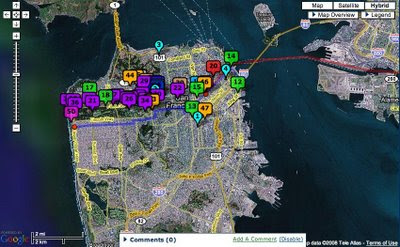i began with this photograph.

this generation is the media maker generation, i said while sharing stories about my students in eating san francisco and digital media production. this is the generation of students i've been waiting for for fifteen years - they make media, they share media, they collaborate with media. at the same time, i shared my profound nervousness about the always-logged-on-ness of this generation. they are crazy creative but they are always on and always connected and some seem to have lost the ability to simply be with themselves and their thoughts. healthy attention spans seem to be at stake.
then i shared my teaching philosophy - log off before you blog off. i explained that i require my students to have offline, physical experiences and then use digital media to create and share stories about these experiences. to explain what i meant by this, i shared two student projects - eating san francisco student ali winston's North Beach Storybook 1 and recent USF media studies graduate lulu mcallister's How to Make a Delicious Omelet Using Wild Foods.


then i excitedly described USF's organic garden.
media studies professor melinda stone, art + architecture professor seth wachtel, and two year's worth of USF's garden project living learning community students have created a food-making, sustainable, beautiful, inspiring, and totally delicious organic garden on campus. USF architecture students designed and built a tool shed for the garden and various media studies classes have blogged, reported, and documented the garden and the gardeners. USF's organic garden offers different opportunities for different students in different courses taught by different professors from different disciplines. in two short years, the garden has become a working garden, a place for contemplation, a classroom, a community garden, a green lab.



time was getting tight so i raced through a past assignment for my intro to media studies students: edit USF's wikipedia page. returning to log off before you blog off, i explained that my students were required to work in groups to find books and other bound materials in gleeson library and to find relevant online resources to back up their wikipedia edits and additions. i mentioned that this semester my digital media production students will return to this assignment.
i ended with a map of san francisco filled with pins that link to blog posts and flickr sets created by last year's digital journalism students. i explained how my students began with campus, stretched to nearby golden gate park, and eventually took on the city as their beat. i then asked what would the map look like if it were generated by multiple students in multiple classes from multiple disciplines from multiple universities?

and then i said virgin america planes look like ipods, said something about me media and we media, and thanked them for inviting me to seattle.


(sorry for photographing only one side of the room!)

































